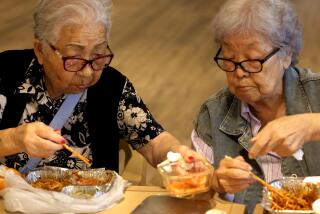Doors Shut at Historic Japanese Print Shop : Little Tokyo: Since early in the century, tiny Empire Printing has recorded the events of a thriving immigrant population.
- Share via
For 78 years, the Nakajimas have been Little Tokyo’s type.
When babies were born, couples were married or old-timers died, the family was there to chronicle the events with printed announcements painstakingly spelled out in antique Japanese characters.
When Japanese families settled in Southern California during the first half of the century, the Nakajimas printed English-Japanese telephone books which welcomed the newcomers--and later helped them prove residency when they applied for American citizenship.
When Americans rushed to do business in Japan during the second half of the century, the family imprinted Japanese translations of names, addresses and phone numbers on the backs of their business cards.
On Thursday, however, Tosh and Ich Nakajima inked up their presses for the last time at their tiny Empire Printing Co. shop on Onizuka Street opposite the New Otani Hotel.
The brothers, 70 and 72, say they are too old to invest $150,000 in repairs that are needed to bring their 100-year-old brick building up to earthquake safety standards. So they are retiring, along with the shop’s three longtime employees.
Printing presses which date back to the late 1880s but still run flawlessly will be turned over to an equipment broker this weekend. Twenty tons of Japanese handset print type will be sold and melted down for its zinc scrap-metal value.
The Nakajimas are saving a wall-length wooden type case containing 3,000 of their largest Japanese-character letters. The century-old type will be donated for display in Los Angeles’ new Japanese American National Museum.
The type was initially used when the Nakajimas’ father, Hitoshi, launched Los Angeles’ first Japanese print shop in about 1912 and began producing a Japanese-English directory for the estimated 3,000 Japanese families then living in the area.
“The directory was my dad’s pride and joy,” Tosh Nakajima recalls. “There was a need for it in the old days. Many people from Japan could not recognize names in English.”
The Nakajima directory later proved even more important in the 1920s and ‘30s when Japanese wrestled with American immigration quotas as they sought permanent resident status, the first step toward citizenship. Such things as telephone books and rent receipts helped immigrants prove that they met residency rules adopted in 1924.
“Anything they could come up with would build their case,” Virginia Kice, a spokeswoman for the Immigration and Naturalization Service, explained Thursday.
Harry Honda, editorial director of the Japanese American Citizens League, said the Nakajimas have turned over their personal collection of old directories to his group for future use by researchers. There are copies from 1926 to 1965--although the Nakajimas’ presses were in storage during World War II when the family was forcibly relocated to an Arizona detainment camp.
“I’m using their 1933 directory to recreate what Little Tokyo was like in those days for something we’re doing for the 50th annual Nisei Week celebration this summer,” Honda said.
Over the years, the Nakajimas did printing for virtually every group in Little Tokyo. “We’d ask them to send up a bill, but they never would,” said Jack Nagano, a founder of the area’s Japanese-American VFW post.
The Empire Printing Co. building has been purchased by a Guam-based development firm with tentative plans to build a hotel or office building atop a shopping complex, said project manager Sigehiro Horii.
Retiring along with the Nakajimas will be printers Roy Kawamoto, 78; Pete Tsutsui, 69; and Shigeko Kubota. She’s a septuagenarian who for years has been in charge of picking the Japanese characters out of type cases with tweezers and composing copy for the presses.
“We all decided we’d go together,” said Ich Nakajima.
Kubota’s last task was to spell out the names of the employees and of 50 members of the Nakajimas’ extended family as farewell souvenirs.
The shop’s last paying customer was clothing shop owner Kenzo Okubo, who ordered new business cards--in English.
Said Okubo: “They’re the last of Little Tokyo’s old guard.”
More to Read
Inside the business of entertainment
The Wide Shot brings you news, analysis and insights on everything from streaming wars to production — and what it all means for the future.
You may occasionally receive promotional content from the Los Angeles Times.









